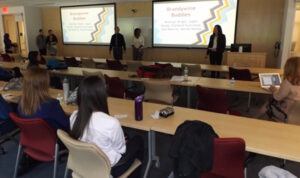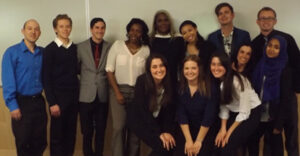CIVCM students at Penn State Brandywine complete final projects
Students in Arto Woodley’s spring 2015 CIVCM 211: Foundations of CIVCM course at Penn State Brandywine explored connections among civic movements, communities, and American democracy through readings, videos, and essay. They learned what it means to be civically “engaged” and how movements have shaped the democracy, as we know it, in the United States. Teams of students synthesized and applied their learning through final projects and by presenting implementation plans that aimed to improve the civic engagement of Brandywine students. Grounded in the class readings and class discussions, students formulated initial ideas and hypotheses, then researched the feasibility and potential impact of their plans by conducting interviews with fellow students as well as administrators and key personnel. Student also investigated what other Penn State campuses are already doing in regard to civic engagement.
Team Democracy members Kevin Pistiner, Daniel Robinson, Rebecca Jones, Tasneema Ahmed, and Peter Conboy developed a plan for a “Questioning” Politics Political Game Show at Penn State Brandywine. The team found that in 2010, only 24% of graduating high school seniors scored proficient or advanced in civics. The team presented a video documentary in which they interviewed students about their knowledge of current politics, asking questions such as, “How long is the term of a governor?” The documentary was powerful in supporting the idea that students need more ways to engage in civics, be more aware of those who serve as their government representatives, and participate in political elections. Their aim was to actively engage students in current events, political affairs, and encourage political discussions among students. Their idea was to hold two campus wide “Questioning” Politics Political Game shows per year, one prior to the primary election (April 21) and one prior to the general election (October 27). A committee of three interested students and one professor would develop the questions, promote the show through email, campus flyers, campus digital screens, and Facebook, and work with campus faculty, student clubs, and others to recruit four teams of students for the event. The campus community will be invited to cheer on their favorite teams and hopefully learn more civics facts.
 The Brandywine Buddies Team, Shannon Wright, Logan Woods, Diamond Gatewood, Josh Mancini, and Moriah Nemia, saw the need for first-year Brandywine students to build community on campus from the start by assisting those students with “Buddies” who will help them form a network and become active members of the Penn State community. Sophomores, juniors, and seniors could apply to be a Buddy. The initial Buddy selection process would include an application and an interview. Selected Buddies would be required to participate in online mentor training and enroll in a one credit course. Each Buddy would then be assigned 10-15 first-year students. The groups would be as diverse as possible to promote cross cultural partnerships. Buddies would engage first-year students in fun activities and competitions to encourage unity and inclusiveness, such as a “BB” color war throughout the semester and point-based competitions to encourage involvement. Incentives could include a pizza party and certificates of completion to all participating members. The desired benefits for first-year students include: networking, establishing career interests, promoting inclusiveness and event involvement. Buddies would benefit in many ways as well, as they would build leadership skills, develop inside knowledge of campus activities, network with students they might not otherwise, learn about internship opportunities, and add to their resume.
The Brandywine Buddies Team, Shannon Wright, Logan Woods, Diamond Gatewood, Josh Mancini, and Moriah Nemia, saw the need for first-year Brandywine students to build community on campus from the start by assisting those students with “Buddies” who will help them form a network and become active members of the Penn State community. Sophomores, juniors, and seniors could apply to be a Buddy. The initial Buddy selection process would include an application and an interview. Selected Buddies would be required to participate in online mentor training and enroll in a one credit course. Each Buddy would then be assigned 10-15 first-year students. The groups would be as diverse as possible to promote cross cultural partnerships. Buddies would engage first-year students in fun activities and competitions to encourage unity and inclusiveness, such as a “BB” color war throughout the semester and point-based competitions to encourage involvement. Incentives could include a pizza party and certificates of completion to all participating members. The desired benefits for first-year students include: networking, establishing career interests, promoting inclusiveness and event involvement. Buddies would benefit in many ways as well, as they would build leadership skills, develop inside knowledge of campus activities, network with students they might not otherwise, learn about internship opportunities, and add to their resume.
Team Equality members Jordan Beeche, Daniells DeMito, Shannon Matthews, Dahlia Quiroz, and Shelby Wright felt that having a web-based, campus-wide calendar of events readily available and visible from all computers on campus would encourage greater student participation in campus events. To come to this conclusion, students in this team interviewed personnel from Brandywine Student Affairs, the ITS department, and the Civic and Community Engagement Lab, and conducted an extensive survey of Brandywine campus students. Survey data (N=100) revealed that 92% of students attended either one or no campus events during Common Hour throughout the week—the time that most events are scheduled. Some of their reasons for non-involvement included: having to go to work, weren’t interested, complete homework during common hour, and unaware of events. Since 64% of respondents said they would be more involved if they could access information about club meetings or campus events in one area, this team focused on how to increase awareness. The team found that their idea for a central calendar was already in the works by the Brandywine ITS department. The team then made suggestions of ways to make the calendar more central, such as making it visible on all digital display monitors and on every campus desktop computer screen as the background wallpaper that students would see as they log on to use the computer.
